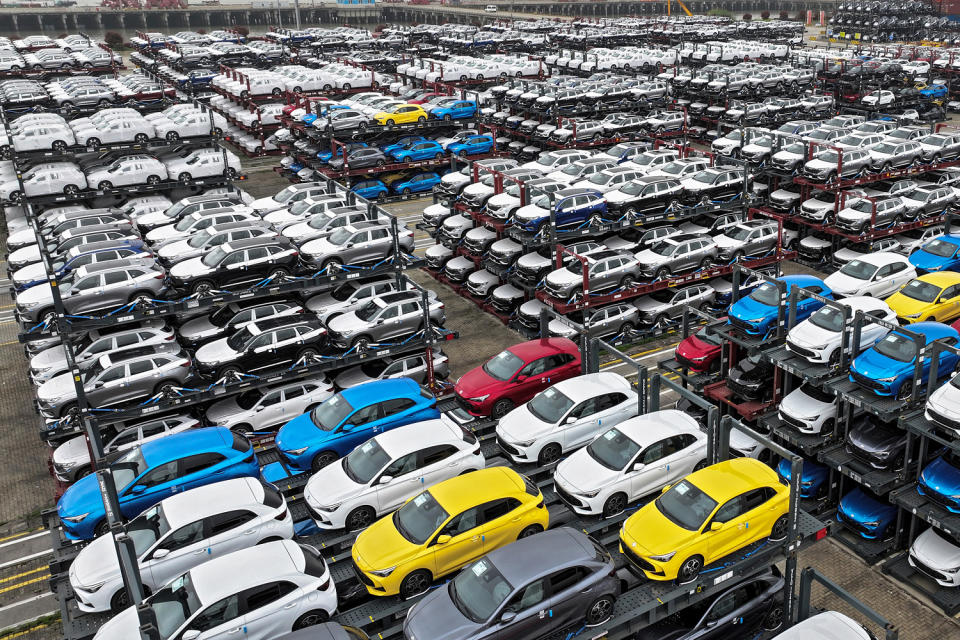Biden moves ahead on tariff hikes for numerous Chinese goods
WASHINGTON — President Joe Biden will announce Tuesday that his administration is raising tariffs on $18 billion of Chinese exports, including electric vehicles, as the White House tries to fight what it says are unfair trade practices by its global competitor.
The move by the U.S. escalates what some economists see as a volatile trade war with China as the world’s two biggest economies wrestle for supremacy.
The White House said the tariff rate for electric vehicles will quadruple, rising from 25% to 100% this year. China’s leading EV manufacturer, BYD, sells the automobiles for as low as $10,000.

“China’s using the same playbook it has before to power its own growth at the expense of others by continuing to invest despite excess Chinese capacity and flooding global markets with exports that are underpriced due to unfair practices,” Lael Brainard, the White House national economic adviser, said on a call with reporters. “China’s simply too big to play by its own rules.”
China has denied the overcapacity accusation as “groundless” and accuses the U.S. of trying to prevent global competition.
The Chinese Foreign Ministry said Tuesday that Beijing “consistently opposes unilateral tariff increases” that violate World Trade Organization rules.
China “will take all necessary measures to safeguard its legitimate rights and interests,” spokesperson Wang Wenbin said at a regular news briefing in Beijing before the tariffs were announced.
The Chinese Commerce Ministry did not immediately reply to a faxed request for comment on Tuesday.
The Biden administration has been signaling the move for weeks. Biden called for tripling tariffs on Chinese steel and aluminum last month.
The White House specified the following tariff hikes Tuesday:
Certain steel and aluminum products will rise from 0–7.5% to 25% this year, and battery parts will rise from 7.5% to 25%.
Lithium-ion EV batteries will jump from 7.5% to 25% this year, while lithium-ion non-EV batteries will increase from 7.5% to 25% in 2026.
Certain other critical minerals will increase from zero to 25% this year.
Solar cells will increase from 25% to 50% this year.
Syringes and needles will go from zero to 50% this year.
Certain personal protective equipment, including certain respirators and masks, will increase from 0–7.5% to 25% this year.
Semiconductors will increase from 25% to 50% by 2025.
Natural graphite and permanent magnets will increase from zero to 25% in 2026.
Rubber medical and surgical gloves will increase from 7.5% to 25% in 2026.
While critics argue that increased tariffs often backfire and raise consumer prices and inflation, the administration insisted that was not the case here.
“There’s no inflationary impact of these actions,” a senior administration official said on the call with reporters. “They’re mainly targeting strategic sectors where we are racking up domestic investment.”
The official argued that a 10% across-the-board tariff would pose more of a risk to consumers. Former President Donald Trump, the presumptive Republican nominee, has floated the idea of a 10% tariff on all imports.
Another senior administration official said on the call: “The previous administration’s restrictive efforts were not paired with affirmative inducements for companies to make investments in strategic sectors. It didn’t include a diplomatic effort to have like-minded countries that are playing by the same rules to join us in confronting China’s trade practices. And so this is a very different strategy in which tariffs are not a stand-alone strategy.”
The Trump campaign has criticized Biden’s planned tariff hike.
“After spending much of his presidency fighting to undo President Trump’s trade policies, Biden’s failure to protect American manufacturers is coming back to haunt his administration and hard-working Americans know it’s too little too late,” Karoline Leavitt, a Trump campaign spokesperson, said in an emailed statement. “The forgotten men and women know President Trump is the only one who has been and will be tough on China.”
The Biden administration is walking a difficult line: It wants to both lower the cost of clean energy in the U.S. and protect American manufacturing at the same time.
“The Biden administration has two competing goals,” said Alex Durante, an economist for the Tax Foundation, a Washington-based think tank. “Tariffs, in general, are bad economic policy. I think the administration should be moving away from them.”
This article was originally published on NBCNews.com
